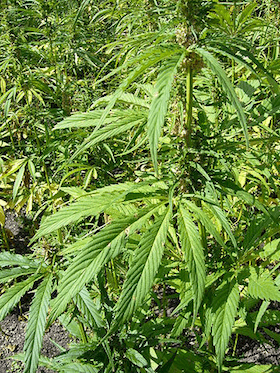You have probably heard that hemp, a variety of cannabis sativa (marijuana) that lacks the high-inducing compounds has a multitude of industrial uses ranging from paper, textile, plastics, and food… and that’s barely scratching the surface.
To say that hemp is one of the most useful plants in existence is not an overstatement. I’m not going to give an A-Z list of all the uses for hemp but I would encourage you to read up on its many uses and take into consideration that hemp is easy to grow, it’s sustainable, and it’s very environmentally friendly.
The Downside to Hemp
The downside to hemp is that it’s not being produced in America. And it’s really not a downside, it’s a travesty and an abomination. Hemp is legally grown all over the world. Spain, China, Japan, Korea, and Ireland all produce hemp and enjoy the economic and environmental benefits that are involved.Do you know which country produces the most hemp in the world? China. Do you know which country imports the most hemp in the world? The United States. Does anyone else view that as a missed opportunity?
The Foolishness of Hemp Prohibition
This is stupid to a mind blowing degree because hemp is not a drug and has no narcotic value whatsoever. It makes about as much sense as entrusting the ports of San Francisco to the IRS.
The DEA is not interested in opening up new economies in America, it’s not interested in improving environmental issues, it’s not interested in progressive, make-sense legislation. The DEA is interested in obtaining and maintaining power. Hemp has so many uses and positive attributes that it could be considered a “super plant” the same way pomegranates are a “superfood”.
But, rather than figure out a way (not hard) to implement production in America and generate organic growth, literally and figuratively, the push to legalize hemp production remains deadlocked.
It’s not for lack of effort. North Dakota, Hawaii, Kentucky, Maine, Maryland, Oregon, California, Montana, West Virginia and Vermont have legalized cultivation of industrial hemp legal, but have not begun production because of pouting from the Drug Enforcement Administration.
The cited concern is usually that, “someone might hide a real marijuana plant in the hemp field.” Really? That’s a sad justification to halt responsible and environmentally friendly economic expansion in the United States.
Hemp Can Rebuild the Nation
I saw an article the other day about Hempcrete, a hemp-based building material. Hempcrete is similar in function to concrete but made with hemp and lime. It’s not quite strong enough to use for structural support and needs to be doubled up with framing but it provides fantastic insulation and other benefits. Check out the above video for a short and very informative overview. If I were about to embark on a building project, I would very strongly consider using a product like this.Call to Action
It is absolutely time to end the obtuse-minded prohibition of hemp production in the United States. If you’re not regularly communicating to your elected officials about issues that concern you, I’d encourage you to begin. If you care about America and the environment, this is a real issue and should be one of yours.-Dr. Edward F. Group III, DC, ND, DACBN, DABFM


No comments:
Post a Comment